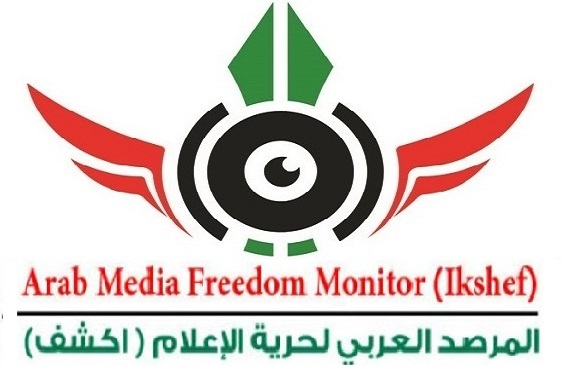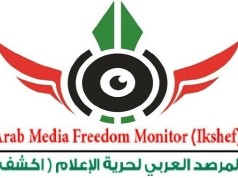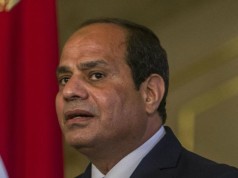
463 violations
130 websites blocked
London – July 16, 2017
The first of 2017 has witnessed 463 violations against, with an average of 83 violations a month, which means a large number of violations as it was a daily practice against press and journalists.
January was the worst with 118 violations, followed by April with 91 violations, then February with 77 violations, May 66 violations, June 58 violations and April with 53 violations.
In terms of the types of violations, cases of detention, arrest and enforced disappearance amounted to 20 cases, prison sentences implemented were 4 cases, prison violations amounted to 33 cases, trials and complaints amounted to 274 cases – the largest number of violations, prevention of coverage were 69 cases , physical abuse 44 cases, prevention of programs and newspapers amounted to 14 cases, layoffs were 4 cases, preventions of writing were 7 cases, restrictive legislations and bans 5 cases and travel restrictions reached 3 cases.
The first half of this year has witnessed 11 releases, but the number of imprisoned journalists remained virtually unchanged and the latest is 96 prisoners.
The first half of 2017 also has witnessed major events such as blocking websites and assaulting journalists at the Journalists’ Syndicate who were protesting against Tiran and Sanafir islands’ deal. A number of journalists were arrested. The incident occurred for the first time, and is very close to the storming Journalists Syndicate by security forces last year. This is in addition to elections of Journalists’ Syndicate and the laws passed by the House of Representatives, which met with great opposition from the syndicate then and journalists in general. This is as well as the preventing Sudanese journalists from entering Egypt and returning them from Cairo airport to Sudan. Moreover, some journalists were accused of terrorism, prevented from traveling, and some of them were detained based on that.
The first half of 2017 also witnessed the release of a number of journalists. However, this did not affect much the total number of imprisoned journalists as it was nearly the same throughout the six months because of continuing to imprison new journalists.
In January 2017, the Egyptian press began facing a series of violations. The most notable event during the month was the inclusion of 28 journalists and media personalities to the list of terrorist entities, seizing their possessions by a decision of the criminal court, banning them from travel and seizing their passports. All these without trial and without allowing them to defend themselves.
February witnessed several sentences of imprisonment with long terms, although most of them are in absentia, and this is what characterized the month, where several sentences to 5 years imprisonment with labor were issued against media personalities Ayat Orabi, Abdul-Rahman Yusuf and Mohammed Shoman. Also, sentences of 6 months in prison were issued against journalists Safwat Omran of Al-Gomhouriya news paper, Hala Al-Badri former editor-in-chief of the Radio and Television magazine and Saad Jalal the journalist of the same magazine.
As for March, the midterm elections for the Journalists’ Syndicate council and of the chairman were held. The elections were not held during the first general assembly due to the absence of a quorum in the presence of 50% as stipulated by the syndicate’s regulation. The elections were held later and 70 candidates ran for 6 seats in the Syndicate’s board and 7 candidates ran for chairman. The result was the victory of Abdul-Mohsen Salama as the chair with more than 2500 votes against 1900 for the rival Yahya Qalash. The board’s seats was won by Jamal Abdul-Rahim, Hussein Al-Zanati, Mohammed Kharaga, Mohamed Saad Abdul-Hafiz, Amr Badr and Ayman Abdul-Mageed.
It was remarkable during this election campaign that freedoms’ programs faded, whether of the candidates who ran on the seats of the board or on the position of the chairman, compared to the previous term, which were the critical factor of the victory of Yahya Qalash with much votes over his rival Diaa Rashwan. This in contrast with this term where services has much propaganda than freedoms, even were decisive for the candidate Abdul-Mohsen Salama, who won a relatively large margin over his rival Qalash, who did not focus strongly on the issue of freedoms as he did before, and that was one of the reasons for his weakness in front of his rival.
At the level of the EJS board, the war of ruling regime was clear against all those who adopted the issues of freedoms in their programs, especially those who had clear contributions in this regard. Khaled El-Balshy is a clear example of this, as he headed the Freedoms Committee for 4 years with obvious effort that angered the regime which tried to get rid of him either by issuing prison sentences against him and the former chairman Qalash and his colleague Gamal Abdul-Rahim before the elections, or to mobilize against him in the elections for his failure, which has already been achieved. however, the board has not become free from supporters of freedoms such as member Amr Badr, who won during this election and is famous for being detained by security forces who stormed EJS headquarters. This id in addition to the victory of Mohamed Saad Abdul-Hafiz, a defender of freedoms also, but both of them were deprived of the chairing Freedoms’ Committee.
Immediately after the election and the victory of Salama, he was subjected to a difficult test following the arrest of journalist Badr Mohammed Badr, the former editor-in-chief of Al-Usra Al-Arabiya newspaper; the arrest of Ahmed Abdul-Moneim the editor-in-chief of Al-Mukhtar Al-Islami magazine; and Ahmed Abu-Deraa the journalist of Al-Masry Al-Youm newspaper. This is in addition to not releasing 3 journalists after a court decision to release them, the ruling was not carried out, and their jailing was renewed for 45 days.
Also in March, 3 media personalities and journalists were sentenced to prison terms, where Islam jumaa the photographer in Misr 25 satellite channel was sentenced to life in prison, and 3 years imprisonment to Mohammed Abu Al-Soul journalist for Akhbar Al-Youm and the same sentence to Ayman Gab-Allah head of Al-Jazeera Mubasher.
As for layoffs of journalists, during March there was mass layoffs of 70 journalist trainees in Sout Al-Omma newspaper after it was purchased by businessman Ahmed Abu-Hashima and the appointment of Khalid Salah as Vice Chairman of the Board.
April witnessed two separate incidents in which Sudanese journalists were prevented from entering Egypt and deported back to their homeland, which aroused great controversy and anger among Sudanese journalists. The Sudanese Journalists’ Union issued a statement denouncing the incident, and there were Sudanese voices calling for a similar treatment with Egyptian journalists. It is worth mentioning here that Ikshef issued a statement condemning the prevention of Sudanese journalists from entering Egypt, and holding them for some time at Cairo airport before their deportation, as contrary to the rules of freedom of movement and travel between the two countries, and harming the distinguished relations between journalists and media professionals in the two states.
May has witnessed many positive and negative incidents. On the positive side, a number of journalists were released and acquitted by court following many years in prison. They are 6 journalists, 5 of them in the case of known as “Rabaa Operation Chamber” and one journalist in another case. Authorities refused to release 2 of those who were ordered to be released, and were held for a long time before their release later.
On the negative side, there are two major negative incidents. The first was the inclusion of 15 journalists in the list of terrorism by a ruling of a criminal court. This was published in the official gazette. The second negative incident was the blocking of a number of websites amounted to 26 websites, including Egyptian websites with official license and issuing newspapers with a license of the Supreme Press Council, as well as several well-known Arab websites famous for professional reputation.
June 2017 witnessed an important incident among the violations that took place during it, and it marks the most notable of that month and the first of its kind. It was the attack on journalists while standing on the ladders of their syndicate to express their rejection of the agreement of handing Tiran and Sanafir islands to Saudi Arabia, following a sit-in organized in EJS headquarters. The attack resulted in injuring a number of journalists and detaining others in an incident no less than storming the syndicate last year, as it is the first time that a journalists’ rally is assaulted before their syndicate.
The number of journalists detained in June compared to the previous months was also high. 6 journalists were arrested from a demonstration by journalist in front of EJS headquarters, and other were arrested because of Tiran and Sanafir agreement, whether because opposing it or because covering protests against it. The number of imprisoned journalists increased to 96 prisoners instead of 94 last month.
The crisis of blocking website continued to cast its shadow for the second month in a row. The number of blocked sites reached 118, especially since no solution was reached, which caused direct damage to journalists, as many of them becameunemployed and lost work. CairoPortal.com website decided to close site and fire all the journalists. Also, Masralarabia.com website announced its intention to fire a large number of editors because of the blocking crisis.




